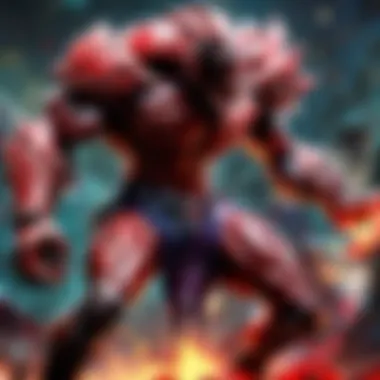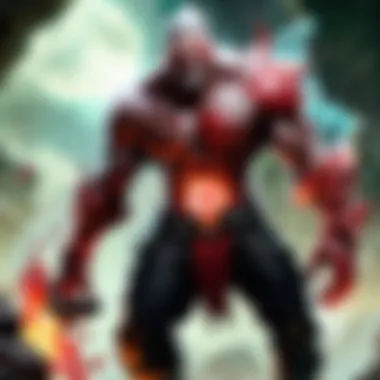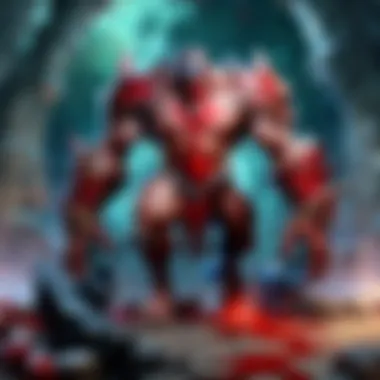Blood from a Boil: Strategic Insights in League of Legends


Intro
The gaming environment, especially in League of Legends, can be hostile. Distributed teams constantly engage in competitive matches where tension often runs high. For many players, challenges can indeed feel like blood from a boil, a concept that entails situations of extreme stress and pressure that ultimately affect gameplay decisions and mental resilience. In this article, we will dissect the implications of this saying, focusing on individual champions, effective strategies, patch updates, and reading community dynamics. The aim is to deepen understanding for both newcomers and seasoned players.
Champion Spotlights
In recognizing the significance of individual champions, understanding their unique attributes and abilities contributes to informed decision-making during matches. The champions in League of Legends encapsulate skill diversity, tactical experimentation, and roadmaps to victory.
New Champion Spotlight
Lee Sin, the Blind Monk, is a familiar example in recent patches. Not only does he exhibit mobility through his abilities, but he also encourages players to layer their tactics carefully while managing cooldowns. By analyzing how his kit synergizes with other champions, players can construct cohesive strategies for both solo play and team engagements.
- Abilities: Lee Sin's Q and R provide substantial engage potential and peeling capacity, emphasizing his ability to thrive in chaotic situations where stress may piggyback onto decision fatigue.
- Playing Style: It’s essential to develop an understanding of counter-play, for instance, punishing mismoments from enemies eager to capitalize on his aggressive plays.
Champion Builds and Strategies
Effective builds can make vital differences in match outcomes. For instance, when building an player favorite like Jinx, her reliance on attack damage means stacking items such as Infinity Edge and Lord Dominik's Regards can maximize her core damage output. Short strategy-based items like The Rapid Firecannon decrease vulnerability during fights, which is crucial when heightened emotions may lead to open errors.
Gameplay Tips and Strategies
- Early Game Tactics: The importance of early-game advantage cannot be overstated. Understanding laning phases keeps pressure on opponents.
- Objective Control: Prioritize securing objectives rather than only dealing damage to opponents, ensuring longevity in matches.
Team Fighting Strategies
Combat within teams presents complexities where synergy becomes pivotal. A successful communication strategy abridges the emotional distance between team members, promoting unity amidst stress. Here, designing frequent practice sessions can foster effective coordination and minimize conflicts.
Prolusion to the Concept
The phrase 'blood from a boil' refers to a specific situation in League of Legends where a player becomes enraged or overly excited after a challenging in-game experience. Understanding this phenomenon is crucial for players who want to enhance both their tactical and mental prowess in competitive gameplay.
In this section, we will also explore the psychological factors behind 'blood from a boil' and the implications of such emotional responses.
Definition of 'Blood from a Boil'
'Blood from a boil' denotes a state of heightened agitation triggered by in-game events. This could stem from a frustrating loss, a mismanaged strategy, or unfavorable player interactions. The term encapsulates how emotional states can heavily influence decision-making, instincts, and ultimately a player’s performance.
Recognizing this definition is the first step in better managing one’s emotional reactions during matches. Players must be aware that such feelings can greatly impact teamwork, enjoyment of the game, and competitive results, with some setbacks leading to a downward spiral in performance.
Relevance in Gaming Context
In the context of competitive gameplay in League of Legends, the concept of 'blood from a boil' is increasingly relevant. Real-time interactions with other players create an environment ripe for emotional and mental stress. Factors that add to this include:
- Competitive Pressure: The significance of win/loss outcomes in tournaments or ranked play.
- Team Dynamics: Navigating relationships and performance expectations among team members.
- Personal Stakes: Each player often invests significant time and effort, making losses feel even more consequential.


Recognizing the dynamics of 'blood from a boil' not only enhances player awareness but also offers insights into behavioral adjustments that promote better in-game decision making. Players can work on cultivating emotional resilience to mitigate the negative effects of such incidents.
"Understanding one's emotional landscape during a game can lead to improved performance in high-stakes situations."
By grasping the implications of 'blood from a boil,' both novice and seasoned players can develop strategies aimed at, at least partly, regulating their mental state. This groundwork will be essential as we delve deeper into the psychological pressures faced in the realm of League of Legends.
The Psychological Impact of Competitive Gaming
The world of competitive gaming, specifically in titles like League of Legends, presents unique psychological challenges. Players are not only tasked with executing strategies but also managing stress factors that can impact performance significantly. Understanding these psychological impacts is crucial. Mental stamina is as essential as technical skill for success. Therefore, addressing psychological elements fosters more resilience and enhances gameplay under pressure.
Stress and Pressure in League of Legends
In League of Legends, stress originates from several sources. These include the expectations set by oneself, competing against opponents, and the dynamics of team cooperation. The pressure to perform well can be intense, leading to feelings of anxiety and panic, especially during tournaments where stakes are high. This pressure often manifests in the need to secure victories or uphold team legacies. Consequently, players may begin to uninstall the fun out of gaming as they prioritize winning.
Factors influencing stress can be categorized into two distinct groups:
- External Factors: These comprise expectations from fans, sponsors, and teammates.
- Internal Factors: This includes personal interpretations of performance and the desire for self-improvement.
Top-tier players often develop strategies to cope with this stress. Familiarizing themselves with their own psychological patterns allows them to respond effectively. Actionable strategies include maintaining open communication, setting individual goals that align with team objectives, and focusing on elements that remain under immediate control.
Research supports the idea that mental stress plays a central role in player performance within competitive environments.
Mental Resilience: Key to Success
Mental resilience correlates closely with sustained performance in gaming. It refers to the ability to maintain focus and recover from setbacks swiftly. In a high-stress atmosphere, mental resilience can differentiate top-performing players from their counterparts. The concept goes beyond merely 'toughing it out'; it involves using positive coping mechanisms to handle failures.
To cultivate mental resilience, players can adopt several practices:
- Error Analysis: Reviewing gameplay to determine both strengths and weaknesses without placing blame.
- Positive Affirmations: Engaging in a consistent self-encouragement routine to foster a positive mindset contributes significantly.
- Support Systems: Building networks of fellow players, coaches, or mentors who understand common stressors in the competitive scene is essential.
These strategies do not guarantee victories but enhance performance sustainability across multiple matchups. In an environment as volatile as League of Legends, cultivating fast adaptation can define a player’s trajectory in their professional path. Overall, proper management of psychological aspects can diminish adverse effects during gameplay, facilitating a healthier gaming experience.
Understanding In-Game Stressors
Understanding the elements that contribute to stress in gaming environments is crucial for players engaged in competitive scenarios like League of Legends. This section aims to uncover how various in-game stressors affect performance and mental health. Identifying specific sources of stress can assist players in crafting effective strategies to manage their responses and enhance overall gameplay efficiency.
Common Sources of In-Game Stress
Stress players experience during matches can stem from a multitude of factors. Some common sources include:
- Performance Anxiety: Players often feel pressured to meet the expectations of themselves and their teammates. The fear of underperforming can add immense mental stress.
- Team Dynamics: Conflicts and misunderstandings within the team can create a tense atmosphere. Poor communication can escalate stress levels adversely.
- Game Mechanics: Complex mechanics and rapidly changing game environments can overwhelm new or less experienced players, compounding their stress.
- Outcome Pressure: The desire to win can intensify every match, especially in ranked play where players face the risk of losing ranks.
Identifying these sources is the first step players should take. Acknowledging the stressor allows individuals to directly address and tackle it in games.


Coping Mechanisms for Players
Players can utilize various coping mechanisms to effectively navigate stress during gameplay. Some strategies include:
- Mindfulness and Focus: Taking a moment to breathe and refocusing thoughts can quiet anxious feelings. Practicing mindfulness can help players stay in control.
- Routine Establishment: Having a pre-game ritual reduces stress. Players can engage in familiar tasks like warming up or reviewing strategies.
- Open Communication: Establishing a supportive dialogue within the team can help mitigate conflicts. When players feel heard, tensions can lessen simultaneously.
- Scheduled Breaks: Pre-planned breaks during longer gaming sessions can serve as a reset for players. Stepping away helps regain composure and perspective.
Players should explore different coping mechanisms consistently. Each individual finds solace in different techniques, making personalized strategies essential.
Understanding the sources and coping mechanisms of stress in gaming should be seen as a key part of development and longevity in competitive settings. Whether you're a seasoned professional or an aspiring player, managing in-game stress is invaluable.
Team Dynamics and Community Engagement
Understanding the dynamics within a team is crucial for success in a collaborative environment like League of Legends. The interactions among teammates can have profound effects on gameplay, decision-making, and ultimately, outcomes of matches. Team dynamics encompass various psychological factors and relational aspects that influence how gamers respond under pressure. A well-functioning team not only strategizes effectively but also maintains emotional stability, essential for critical in-game moments. This article will focus on how team dynamics and community engagement shape the player experience.
Team Stressors: Navigating Group Dynamics
The environment in which players operate can introduce unique stressors that affect their performance. These stressors often come from interpersonal relations, communication styles, and differing levels of dedication among teammates. When one player feels overwhelmed, it affects the whole group, compounding stress levels. It is vital to acknowledge factors that can heighten stress and develop strategies to manage them. Arguments over tactics, disagreements concerning roles, or unequal contribution to team effort can lead to friction.
This results in a fractured performance on the battlefield. Recognizing and addressing these issues early can improve teamwork considerably. Teams may benefit from open communication channels, regular meetings to check team pulse, and setting clear expectations about roles. Teams may choose structure with formal leadership or encourage a flat hierarchy where input is shared equally, depending on group dynamics.
“Effective communication remains a cornerstone of good teamwork in high-pressure environments.”
It is worth noting that teams which can openly discuss concerns and frustrations often foster an environment of greater trust. This trust allows members to voice issues without fear of reprisal, creating a supportive atmosphere. Greater awareness of other players' moods and levels of comfort is essential to navigate these stresses successfully.
Community Impact on Individual Player Experience
Community plays a significant role in shaping an individual player’s experience. A strong community interacts positively, offering feedback and advice which can refine player skills. Online platforms like Reddit allow players to seek help, share strategies, and engage in discussions about gameplay tactics. A supportive network enhances learning opportunities and mitigates feelings of isolation often encountered in competitive settings.
However, this community can be a double-edged sword. While positive relationships within the community foster growth, toxic interactions can leave players discouraged and insecure. Issues such as harassment or negative feedback can diminish motivation and emotional well-being. Players need guidance on navigating this landscape, striking a balance between receiving constructive criticism and parking irrelevant negativity.
By establishing norms for healthy community interactions, players can create an enriching environment. This also means surrounding themselves with supportive individuals, rather than focusing on hostile gameplay experiences. Fielding positive connections boosts confidence and resilience, both in and out of the game. Simultaneously, it’s advisable to develop the perspective to ignore negativity that does not provide constructive value.
Strategies for Improved Gameplay Under Pressure
Understanding the strategies for improved gameplay under pressure is essential for those engaged in competitive environments like League of Legends. The psychological and emotional dimensions of the game often shape performance, especially under high-stress situations. Implementing specific strategies can enhance a player's ability to engage constructively in adrenaline-fueled moments.
Strategies center around self-regulation, mental focus, and community engagement. Players themselves can we truly count on a few actionable points that might improve their performance.
Mindfulness Practices for Gamers
Integrating mindfulness practices into the gaming experience can result in substantial benefits. Being conscious of one's thoughts and emotions allows players to maintain a level of calmness during intense matches. A few techniques that have been recognized for their utility in esports include:
- Deep Breathing: Taking moments to focus on breath can lower stress levels. Pausing before major activities or decisions can help normalize heart rates and clear mental fogs.
- Visualization: Before a match or during downtime, it can be valuable to visualize both success and potential hurdles within a game scenario. This practice can prepare the player mentally for situations they may face.
- Focus Shifts: Gamers should practice focusing on the present rather than worrying about the outcome, which would help minimize anxiety.


These strategies aim at essentially building an intrinsic reserve of emotional control that can be applied in-game, thus fostering younger players. Overall, mindfulness contributes not just to performance, but overall enjoyment of the game.
Incorporating Breaks and Downtime
Incorporating breaks and downtime is easily overlooked by many competitive players. In a fast-paced game like League of Legends, it may seem counterintuitive to step back from the screen. However, regular intervals of rest are vital in preventing burnout and relapse into poor-quality play during intense times. Consider the following:
- Scheduled Breaks: Establishing a routine not only helps to refresh the body, essentially returning to the rigors behind the keyboard smooth but also renews cognitive functions crucial for gaming strategy. Breaking for a few minutes every sixty to ninety minutes helps.
- Mental Reset: Finding an off-screen activity to reset thought processes during breaks can act as an antidote to game-related stress and fatigue. Simple things like taking a walk, stretching, or performing light exercises can facilitate better mental clarity when gaming resumes.
- Community Interaction: Engaging with fellow players—either during gameplay or breaks—can bolster morale, reduce social anxiety, and create a sense of belonging. Such engagement can be revitalizing.
Ultimately, incorporating breaks is a thoughtful approach for maintaining longevity and effectiveness in gameplay, enhancing focus and energy levels when reconditioning to make titans decisions. The aspiration should be to create a pathway toward performance best as one develops their refined skills. In times of great tension, exploiting every potential means for improvement can turn the tide in competitions.
Case Studies: Notable Competitive Scenarios
Case studies in competitive gaming, particularly League of Legends, play a crucial role in understanding the concept of "blood from a boil". These scenarios showcase not just the strategies involved but also highlight significant psychological aspects stemming from high-pressure environments. Evaluating these case studies aids in discerning how players react under stress and how these reactions can impact both their performance and the game itself. Important elements to consider involve individual emotional responses, the role of team dynamics, and how stressful situations trigger various tactical adaptations. By analyzing different competitive moments, players at all levels can derive valuable lessons and develop a deeper understanding of their gameplay approaches arising from emotional stimuli present in these scenarios.
High-Pressure Tournaments: Analyzing Outcomes
High-pressure tournaments are the epitome of competitive gaming's emotional landscape. These events generate a mix of anticipation and dread that affects player performance. During tournaments, the visibility intensifies as each move becomes scrutinized by spectators and analysts alike, exuding palpable pressure to perform. We can observe different outcomes during such events, where the stakes include not just winnings but the honor associated with victory in front of thousands of fans.
Factors influencing outcomes vary greatly, but they include:
- Player Experience: Veteran players might have cultivated stronger mental fortitude, enabling better performance under pressure.
- Team Coordination: Cohid And teamwork hold great importance; strong, synchronized teams effectuate strategic plays, while mismatched or discordant teams often falter.
- External pressures: Elements like sponsors and fan expectations also amplify the stress, complicating how players focus.
These cases reveal that chemistry and experience heavily influence results in tournaments. Failure and triumph are frequently separated by thin margins in these clutch circumstances. Each scenario provides insights on how well players can handle stress and perform in high-stakes world.
Player Responses: Success and Failure
The emotional responses of players of League of Legends in high-pressure situations can directly indicate the concept of "blood from a boil". These reactions often categorize into two broad groups: success and failure. The path from stress to either outcomes is instructive.
When successful, players harness stress effectively, often leveraging adrenaline to sharpen their focus and reaction time. Key aspects of successful mental responses may include:
- Mental Preparation: Players who enact rigorous practice routes often build resilience against fatigue and pressure fatigue.
- Adaptability: Those able to adjust strategies based on real-time assessments can capitalize effectively during chaotic moments.
Conversely, the instances of failure lay bare how breakdowns occur during periods of extreme anxiety. Some notable contributions to failure include:
- Negative Self-Talk: A player plagued with doubts can diminish their confidence, negatively affecting gameplay.
- Team Miscommunication: Poor communication among team members tends results failures, often compounding stress and chaos.
Ultimately, examining these responses enrich the understanding necessary for any player wishing to improve. Success in these high-stakes conditions transcends technical skill, encompassing psychological aptitude and teamwork adaptability. Emphasis on strategies derived from past outcomes can mold future maximal success. Knowledge culminated from understanding these competencies prepares players fittingly for forthcoming situations.
Understanding emotional intelligence and player dynamics is fundamental to performing well in tournament conditions.
The End: Moving Forward with Awareness
In the League of Legends community, the phrase 'blood from a boil' encapsulates more than just a moment of heated gameplay. It serves as a critical reflection on the psychological nuances within competitive gaming. This closing section emphasizes the importance of understanding the intricate web of emotional intelligence, mental challenges, and the dynamics of community support.
Gaming is not merely about strategy or tactics. Emotional intelligence plays a vital role in guiding player decisions. Recognizing one's own feelings and those of teammates can streamline communication, enhance collaboration, and mitigate stress. This element lies at the heart of exceptional gameplay. Players who master their emotions can encounter challenges with greater stoicism and clarity, translating pressure into performance gains.
Moreover, fostering a supportive gaming community helps to cultivate mental resilience among players. When gamers share experiences and strategies to overcome stress, they nurture a healthier esports culture. Community interaction has the potential to create a positive atmosphere where players feel valued and understood. This support system can act as a powerful buffer against the adversities faced in gaming.
Engaging with the community also means developing networks for mentorship. Experienced players can guide newcomers by sharing insights on navigating emotional states during high-pressure situations. This exchange enhances the collective skill set and enables a broader understanding of what it takes to succeed in competitive environments.







